2023 International Monetary Forum
2023-08-04 IMIOn July 22nd, the “2023 International Monetary Forum” was held in Beijing. The event was hosted by the School of Finance at Renmin University of China and the School of Finance at Nankai University. It was organized by the International Monetary Institute (IMI) at Renmin University of China, co-organized by Beijing Bank, and supported by Chongyang Investment Education Fund. The forum was themed by “High-level Opening-up and Regional Cooperation”. Participants engaged in enthusiastic discussions on topics such as “High-level Opening-up and RMB Internationalization,” “High-level Opening-up and High-Quality Financial Development,” and “Digital Transformation in High-Quality Development of the Financial Industry.”
Scholars and experts attended the meeting. They are Zhang Donggang, Secretary of the Party Committee of Renmin University of China; Chen Yulu, President of Nankai University; Dai Xianglong, former Governor of the People's Bank of China; Chen Wenling, Chief Economist of China Center for International Economic Exchanges; Huo Xuewen, Chairman of Beijing Bank; Peng Wensheng, Chief Economist and Director of CICC Institute; Wu Xiaoqiu, Dean of National Academy of Finance and Development at Renmin University of China; Zhou Chengjun, Director of Financial Research Institute at the People's Bank of China; Di Gang, Deputy Director of Digital Currency Research Institute at the People's Bank of China; Chen Daofu, Deputy Director of Financial Research Institute at the Development Research Center of the State Council; Ba Shusong, Executive Director of HSBC Business School at Peking University; Chen Weidong, President of Bank of China Research Institute, and other renowned experts and scholars from domestic and international financial regulatory agencies, research institutions, and financial industry.
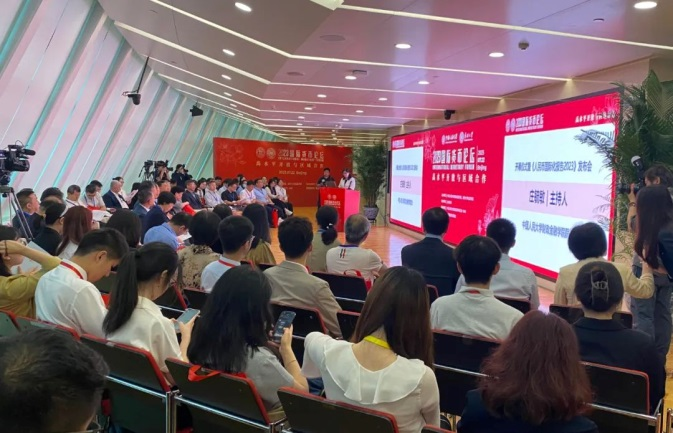
At the opening ceremony of the “2023 International Monetary Forum and the press conference of the 2023 RMB Internationalization Report” held on the morning of July 22nd, Zhang Donggang and Chen Yulu, representing Renmin University of China and Nankai University respectively, delivered opening speeches.
Zhang Donggang pointed out that in terms of macroeconomics, accelerating a new development pattern and high-quality development requires changes in quality, efficiency, and driving forces. We need to continue high-quality development, pursue a high-level opening-up to improve the macroeconomic governance system. China’s way of doing things imply Chinese values, theoretical systems, policy orientations, and specific measures. Therefore, it is great and grand. For a long time, Renmin University of China and its Economics discipline have taken it as their responsibility to answer “Four Questions” including the question of China, the world, the times, and the people. They focus on China's reality to address challenges, and actively serve China's modernization. Since 2012, Renmin University of China has regularly released the RMB Internationalization Report and organized the International Monetary Forum, which has become an important window to showcase the achievements of China's economics discipline, providing intellectual support for the prosperity of the world economy and the high-quality development of the Chinese economy.
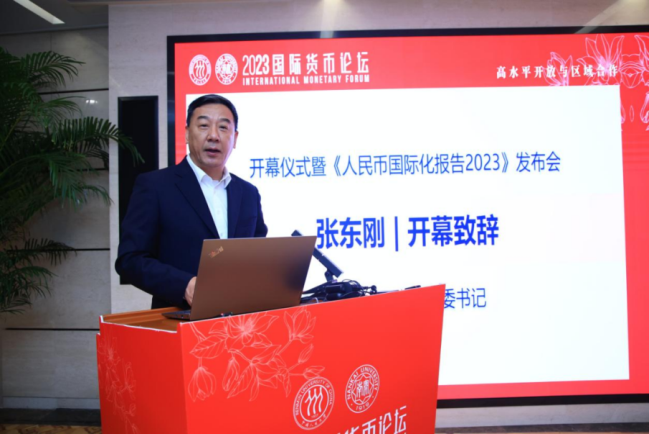
Chen Yulu pointed out the RMB is gaining momentum in its level of internationalization, and is expected to become the most dynamic and promising global high-quality public product. Noting that the RMB has become one of the major international currencies, he said that efforts are necessary on three fronts to strengthen its globalization further. A modern industrial system that is underpinned by the real economy should be completed. Progress is also needed in deepening financial market reforms and in the establishment of infrastructure for RMB globalization. In addition, there must be a high level of balance between the institutional opening-up of China's financial system and its risk control. Global challenges, such as the impact of the pandemic and geopolitical conflicts, have made the problem of insufficient international currency supply more urgent. The internationalization of the RMB offers emerging markets and developing economies a new option, and also drives the international monetary system toward a direction of diversified competition. This will, in turn, enhance global economic stability.
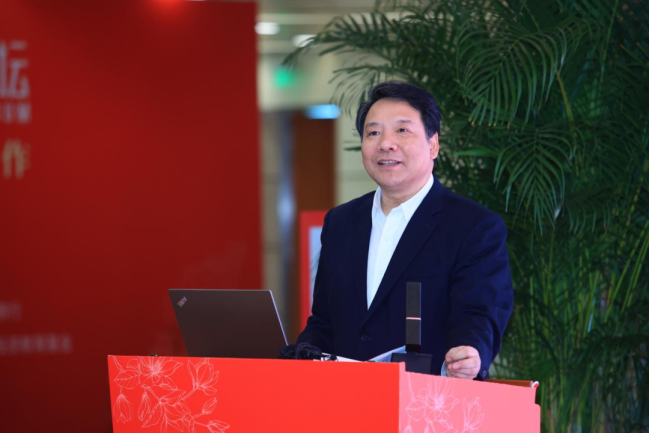
The opening ceremony’s welcoming remarks were presided over by Zhuang Yumin, Dean of the School of Finance at Renmin University of China.
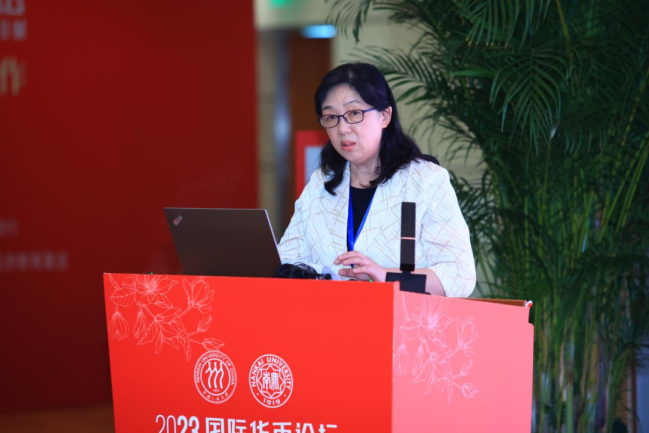
During the event, the 2023 RMB Internationalization Report was released. Wang Fang, the report’s chief editor, Associate Dean of the School of Finance at Renmin University of China, and Deputy Director of the International Monetary Institute, provided an interpretation of the report. She pointed out that the international use of RMB has maintained a historically high level, with a continuing upward trend and enormous potential for future development. Furthermore, the report emphasizes the impact mechanism and significant importance of economic and trade cooperation on currency internationalization. As an effective path for China to achieve high-quality development and RMB internationalization, international economic and trade cooperation can promote economic integration and the economic and financial development of member countries. Therefore, future RMB internationalization needs to focus on broader and multi-level economic and trade cooperation, steadily expanding high-standard institutional openness, and promoting a deeper and more substantial internationalization of RMB. Specifically, the advancement of international economic and trade cooperation can be pursued from the following three aspects: First, actively promote resource integration and industrial chain restructuring under the framework of Regional Comprehensive Economic Partnership to optimize the conditions for RMB usage within the region. Second, continue to strengthen cooperation between Chinese and European enterprises, attach importance to the institutional guarantees of the China-Europe economic symbiotic relationship, and address the difficulties and challenges faced by agreements such as the China-EU Comprehensive Agreement on Investment. Third, proactively apply to join the Digital Economy Partnership Agreement to share China’s achievements and experiences in digital economic development with the world.
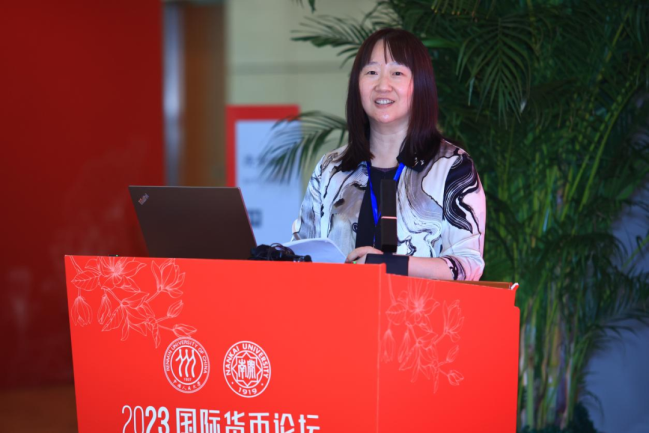
Subsequently, distinguished guests including Dai Xianglong, Chen Wenling, Huo Xuewen, Peng Wensheng, and Wu Xiaoqiu delivered keynote speeches one after another.
During his speech, Dai Xianglong mentioned that to construct a Chinese-style modern financial system, it is essential to strive for achieving multiple objectives before 2035. Among these objectives, RMB internationalization is a core component of China’s modern financial transformation. First and foremost, it is crucial to have a correct understanding of the purpose of RMB internationalization. RMB internationalization is not only necessary for China’s reform and opening-up but also for the improvement of the international monetary system. It is not about challenging the US dollar, nor is it aimed at replacing it. Secondly, it is necessary to accurately assess the international influence of RMB internationalization at present. In a comprehensive evaluation, the international status of RMB is not inferior to that of the Japanese yen and the British pound. However, its level of internationalization is still relatively low, and the relevant systems are not yet fully developed, facing various challenges. To promote RMB internationalization in an orderly manner, two aspects are crucial: First, improving the institutional arrangements for RMB internationalization, and second, seizing opportunities and choosing the right timing to make breakthroughs.
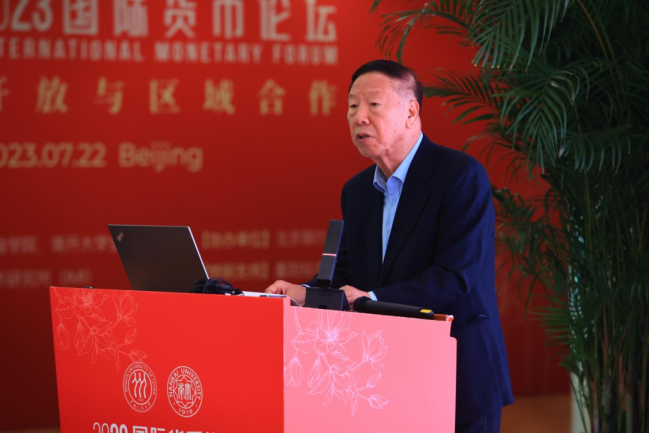
In her speech, Chen Wenling pointed out that modern finance is the core of a modern economy and an important component of building a socialist modernized and strong country—a financially strong nation. It represents a critical strategic choice in China’s process of Chinese-style modernization, especially amid the current intense competition among major powers, particularly between China and the United States. Specifically, she highlighted three key points. First, global financial policy adjustments should closely monitor the shift in the United States’ monetary policy. Second, it is essential to recognize that the global trend of “de-dollarization” is an unstoppable long-term process. Finally, RMB internationalization is a lengthy journey that requires continuous efforts and the creation of high-quality institutional supply.
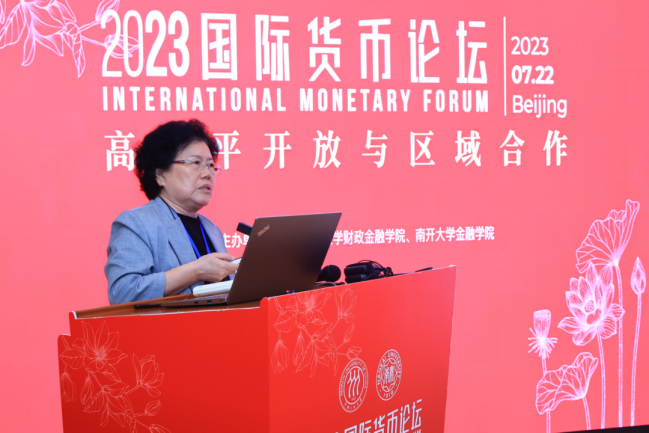
During his speech, Huo Xuewen emphasized that the internationalization of the RMB is a historical process that requires various conditions to be fulfilled. These conditions include the establishment of regulations and systems by the country, cooperation among regulatory agencies from different nations, the presence of robust infrastructure for currency transactions and settlements, cross-border trade and investment, international asset allocation, and international cooperation within the financial industry. High-level openness is an unwavering development strategy of the country, and RMB internationalization is an essential path towards achieving this high-level openness. As the national financial management center, Beijing holds a crucial position in fostering financial high-level openness and international financial cooperation. Beijing Bank will actively play its role in promoting the internationalization of RMB and safeguarding the country’s financial security and stability, contributing its efforts to China’s process of Chinese-style modernization and high-quality development in the financial sector.
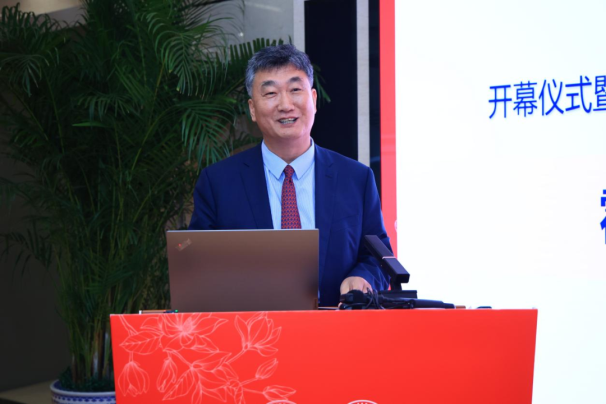
In his speech, Peng Wensheng pointed out that although the proportion of the United States in the global economy has declined, the status of the US dollar as an international reserve currency has not diminished. Over the past 40 years, the globalization and financialization under the dominance of the US dollar system have led to a series of issues, prompting people to reflect on the non-neutrality of currencies, excessive financial expansion, and the impact of globalization, leading to a shift from the trilemma to the dilemma. The trend of “de-globalization” is characterized by increased supply constraints and greater government resource allocation, while “de-financialization” is reflected in strengthened financial regulation and increased fiscal roles. In this context, we need to contemplate new perspectives and characteristics for currency internationalization. History will not merely repeat itself, and we are not facing a simple repetition of the Bretton Woods system. With the decline of the financial role and the rise of the real economy, China, as a representative of a large-scale real economy and relatively small international financial role, will encounter new opportunities for RMB internationalization.
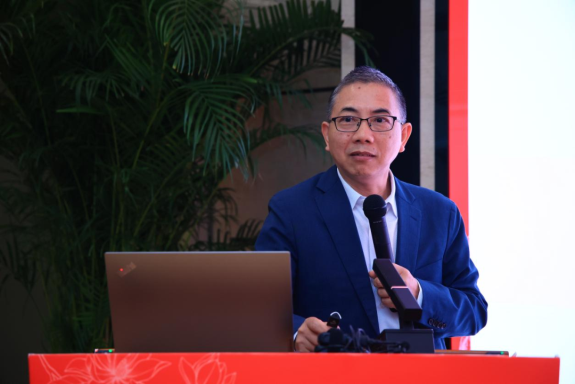
Wu Xiaoqiu pointed out in his speech that the new world order requires an adaptable multipolar and diverse international monetary system, in which the RMB should play an equally significant role as the Euro. The historical starting point and main path for the RMB internationalization lie in its liberalization and marketization, making it one of the freely tradable international currencies. This indicates that both our own country and others have confidence in the RMB. This confidence stems from three aspects: First, the institutional foundation, which includes the socialist market economy system with Chinese characteristics and a sound legal system. Second, economic capabilities, mainly reflected in economic size, competitiveness, international trade, and technological innovation. Third, the financial market, which requires promoting the opening-up of China's financial sector, especially the capital market, to create mechanisms for the substantial offshore RMB to flow back into the domestic market for investments. By 2035, the RMB should stand shoulder to shoulder with the Euro, forming a new pole in the international monetary system.
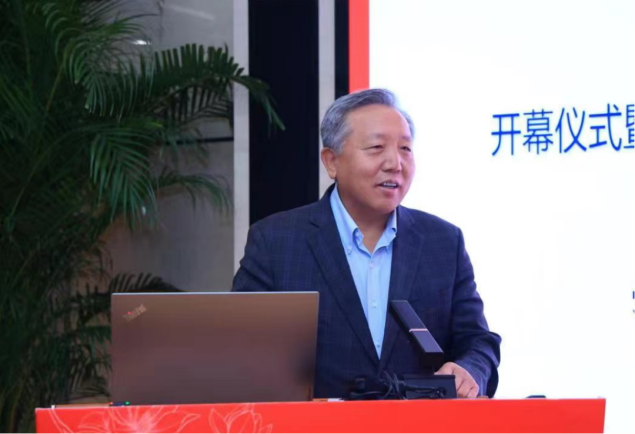
The keynote speech session was chaired by Zhang Jie, the Director of the International Monetary Institute at Renmin University of China.
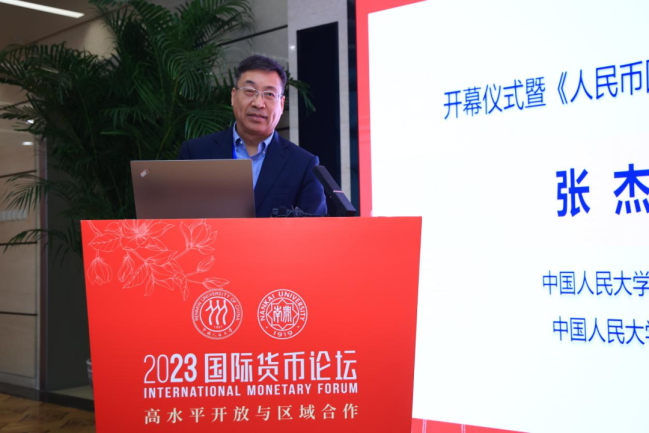
On the afternoon of July 22nd, three different parallel forums were held simultaneously.
Parallel Forum I,titled “High-level opening up and the RMB internationalization,” was presided over by Qian Zongxin, Vice Dean of the School of Finance at Renmin University of China. Zhou Chengjun, Director of the Institute of Finance at the People's Bank of China, and Chen Weidong, President of the Bank of China Institute of International Finance, delivered keynote speeches. Prominent guests, including Guo Jianwei, former Chief Editor of China Financial Publishing House, Ding Zhijie, Director of the Foreign Exchange Research Center of the State Administration of Foreign Exchange, Zhang Liqing, Director of the International Finance Research Center and former Dean of the School of Finance at Central University of Finance and Economics, Zhou Yueqiu, Chief Economist and Chairman of the Academic Committee of Beijing Financial Street Research Institute and former Chief Economist of the Industrial and Commercial Bank of China, E Zhihuan, Chief Economist of Bank of China (Hong Kong), Qu Fengjie, researcher at the Institute of Economic Research under the National Development and Reform Commission, Zhou Yinggang, Dean of the School of Economics at Xiamen University and Dean of the Wang Yanan Institute for Studies in Economics, Wang Wen, Executive Dean of Chongyang Institute for Financial Studies at Renmin University of China, Tu Yonghong, Deputy Director of IMI and Dean of the Academy of Yangtze River Delta Studies at Renmin University of China, Lu Liping, a researcher at IMI and associate professor at the School of Finance at Renmin University of China, and more than ten other guests engaged in in-depth discussions on the topics of “High-level opening up and the internationalization of the RMB” and “Regional cooperation and the evolution of the international monetary system.”
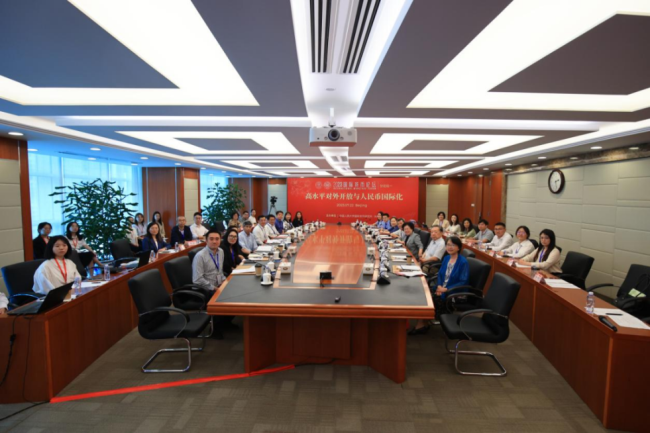
Parallel Forum II,titled “High-level Opening-up and High-Quality Financial Development,” was organized by the School of Finance at Nankai University. The forum was chaired by Fan Xiaoyun, Dean of the School of Finance at Nankai University. Di Gang, Deputy Director of the Digital Currency Institute of the People's Bank of China, Chen Daofu, Deputy Director of the Institute of Finance at the Development Research Center of the State Council, and Ba Shusong, Executive Director of the HSBC Financial Research Institute at Peking University, delivered keynote speeches. Former Governor of the People's Bank of China, Dai Xianglong provided his insights and comments on the lectures. Following the keynote session, Li Quan, Director of the Institute of Finance at the School of Finance at Nankai University, Tan Xiaofen, Professor of Finance at the School of Economics and Management at Beihang University, Wu Yue, Deputy Director of the Local Financial Supervision and Administration Bureau of Tianjin Municipality, and Zhang Falin, Vice Dean of the National Security Institute at Nankai University, engaged in enthusiastic discussions on the theme of "High-level opening and modernization of China's financial system," under the moderation of Li Zeguang, Head of the Department of Finance at the School of Finance at Nankai University. At the same time, under the guidance of Wang Bo, Director of the Institute of Digital Finance at the School of Finance at Nankai University, Professor Fang Yi from the National Development and Strategic Research Institute at Renmin University of China, Professor Hu Haifeng, Head of the Department of Finance at the School of Economics at Beijing Normal University, and Wang Zhigang, Director of the Data Center at the Chinese Academy of Fiscal Sciences, engaged in in-depth discussions on the theme of “High-level opening up and prevention of financial systemic risks.” Dean Fan Xiaoyun provided her comments on the research session.
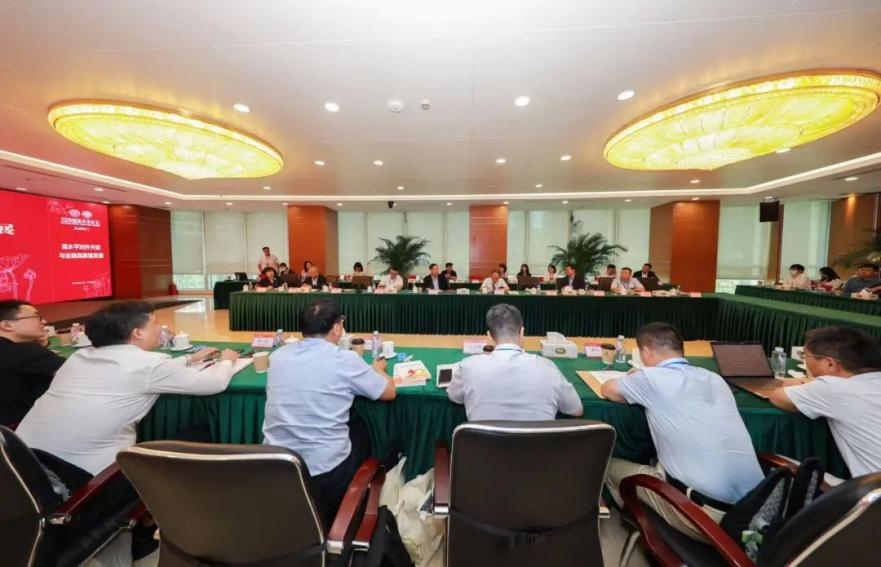
Parallel Forum III, titled “Digital Transformation in High-Quality Development of the Financial Industry, and the Fourth Financial Technology Youth Academic Seminar,” was co-hosted by the International Monetary Institute (IMI) at Renmin University of China and the Financial Technology 50 Forum (CFT50). The Tencent Research Institute was the joint organizer, and the Financial Technology Research Center of the National Financial and Development Laboratory provided guidance. The event was also supported by the Institute of Finance at the Chinese Academy of Social Sciences and the editorial departments of both Chinese Review of Financial Studies and Exploration of Financial Theory journals. The meeting was chaired by Song Ke, Deputy Director of the International Monetary Institute at Renmin University of China. The opening remarks were delivered by Zhang Xiaojing, Director of the Institute of Finance at the Chinese Academy of Social Sciences, Ye Yanfei, Former First Inspector of the Policy Research Bureau of the China Banking and Insurance Regulatory Commission, and Zhang Xin, Vice President of Tencent Group. Following that, Cheng Lian, Secretary-General of the Academic Committee of the National Financial and Development Laboratory and Director of the Chinese Review of Financial Studies editorial department, provided an overview of the Fourth Youth Paper Collection Activity. Under the moderation of Du Xiaoyu, Deputy Director of Tencent Research Institute, Zhang Qian, Member of the Party Committee and Deputy Secretary-General of the China Insurance Asset Management Association, Yang Tao, Deputy Director of the National Financial and Development Laboratory, Luo Yu, Deputy Secretary of the Party Committee and Professor at the School of Finance at Renmin University of China, and Yin Li, Professor at the School of Finance at the Central University of Finance and Economics, Longma Scholar, and Doctoral Supervisor, provided comments on some of the winning papers of the youth paper competition. Finally, the award ceremony for the authors of the Fourth Financial Technology Youth Competition took place.
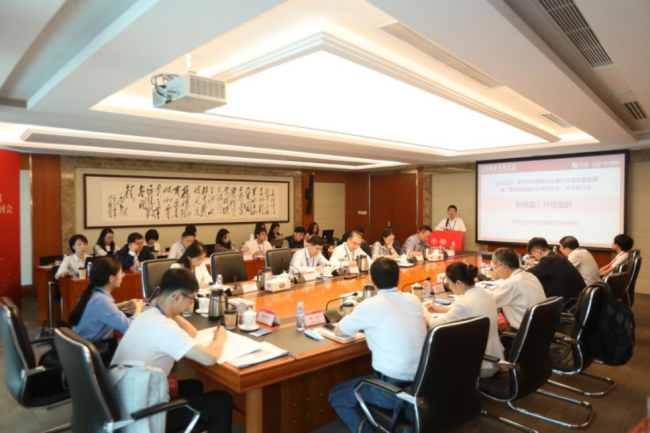
Translated by Zhou Yulong, Geng Wei and Dong Hanyu
